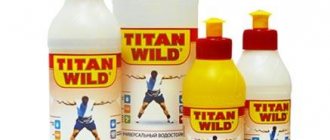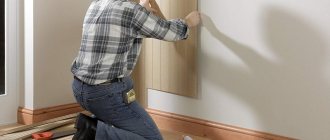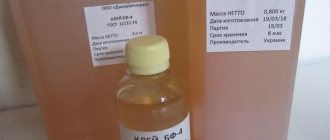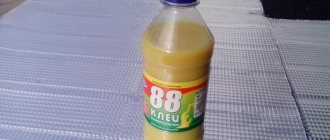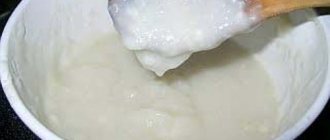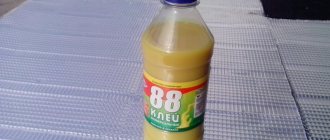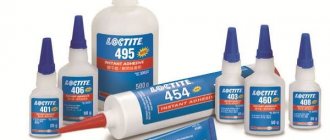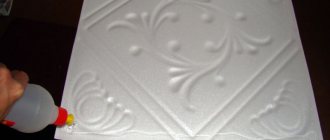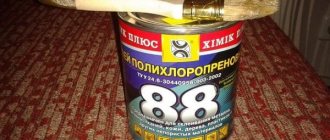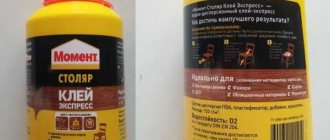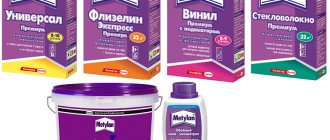Modern technologies make it possible to create glue for different needs and specific applications. Titan glue stands out from other manufacturers.
Popular with both ordinary buyers and professional builders. A large number of positive reviews and excellent technical characteristics allow it to occupy a leading position in the construction market among similar products.
Titan glue is a good all-purpose glue. Used in construction, repairs and in everyday life. Has exceptional adhesion to most materials. The adhesive composition is suitable for durable connection of dissimilar materials. It has proven itself when working with ceiling tiles made of polystyrene foam and expanded polystyrene.
Universal, and most importantly, high-quality glue will help to reliably glue materials such as ceramics, linoleum, artificial and natural leather, glass, paper, wood, parquet, PVC panels. In addition, “Titan” is used to secure decorative elements, for example, made of plaster.
Considering the specifics of different types of adhesive products of this brand, Titan adhesive has good performance characteristics. It performs well in conditions of high humidity and significant temperature changes, without loss of quality or reduction in adhesive ability.
Unlike other analogues, Titan does not become brittle after hardening. If we look at the composition of the glue in detail, there are no harmful components, which makes this product safe to use and further use during construction/repair of housing.
Peculiarities
The Tytan company, part of the Polish company Selena, specializes in the production of various building compounds: polyurethane Titan with high moisture resistance, adhesives with a wide range of uses, polyurethane foam and much more.
In this article we will take a closer look at liquid nails from the above-mentioned manufacturer. Most of all adhesives are universal products that are used both for household repairs and for large-scale work. Excellent performance indicators of the products are ensured due to special additives in the composition. All goods are produced abroad and come to Russia through official distributors.
The solution of the problem
Glue is used in everyday life; it can be used to connect parts of a broken toy or restore interior items, as well as eliminate defects in furniture. However, in order for the work to be successful, it is necessary to choose the right glue. One of the best is the composition produced under the Titan brand. This will be discussed in the article.
How to apply the composition?
To apply liquid nails, you need to use step-by-step instructions.
- The working surface must be washed, dried and, if necessary, degreased.
- There is no need to apply the composition to the entire base. A stripe or dotted line will be enough.
- For greater convenience, a special pistol is used.
- To protect indoor furniture and other items, use film, thick fabric or newspapers.
- Remember that the setting process takes a second, so the work must be done quickly. Afterwards, you need to securely connect the parts and hold them for about two minutes, pressing them tightly against each other.
- The process of complete hardening occurs in about a day. During this time, it is recommended not to load the connected elements.
Laying linoleum
After the measurements have been taken, the fabric is cut along the edges, leaving allowances for adjustment. If the wall is smooth, they begin to glue the PVC coating closely or overlapping, so that they can trim it later.
In the photo: laying and cutting linoleum with your own hands.
When laying linoleum from two strips, do it perpendicular to the window so that the seam is lost in the direction of the light. Then the floor covering will seem monolithic. Linoleum should be joined correctly so that the pattern on one piece matches the image on the other. They begin to roll out the second sheet from the joining point, overlapping it onto the previously spread sheet, this subsequently allows for an even and neat cut to be made.
Universal construction adhesive 601 (Liquid nails)
Rubber adhesive Tytan No. 601 is produced in cylinders with a mount for a mounting gun. The main advantage of liquid nails over other formats is the ability to glue surfaces slightly spaced from each other (i.e., it does not require a complete fit). Titanium 601 will easily replace nails and screws.
The composition does not lose its properties in the temperature range from -30 to 60 °C. Apply a thick layer to the entire surface, initial hardening takes 5–10 minutes, complete drying takes 24 hours.
Titanium liquid nails are perfect for gluing metal, glass, ceramics, wood, PVC, polyurethane and thermal insulation materials. They cope with heavy building materials, structures and decorative elements.
For gluing heavy structures, the Tytan line includes heavy-duty adhesive No. 901.
Criterias of choice
When choosing an adhesive for fixing a floor covering, it is worth considering a number of criteria.
Subfloor type
First of all, you should focus on the type of subfloor. Depending on this, one or another composition is chosen.
Absorbent
This category includes a cement or concrete base. Absorbent coatings also include chipboard, fibreboard, OSB, plywood flooring or solid wood. For such substrates, it is recommended to choose a water-soluble composition.
It is worth considering some features. Board materials can become deformed from excess moisture. Therefore, thick formulations with a minimum of water are suitable for them. Any adhesive will work for concrete.
Non-absorbent
This category includes floors that are lined with natural stone, tiles or porcelain stoneware. In this case, water-soluble compounds will not have an effect, since there is no space for moisture to escape. In this situation, reaction adhesives are suitable
When using them, it is important to follow safety rules - use protective gloves and a mask. Room ventilation is important
Linoleum can be based on different components. There are homogeneous and heterogeneous compositions. Often the coating is made of PVC. It is worth choosing glue taking into account the manufacturer’s recommendations. Gummilak is suitable for foam coating. It provides excellent adhesion and helps avoid damage to the coating. For commercial linoleum with a complex composition, you will need a special substance.
Range
The product catalog of the Tytan brand is varied. Let's take a closer look at the three types of product.
Classic Fix installation product
Classic Fix glue (“Classic Fix”) has versatility. Due to this, the composition can be used indoors and outdoors. To make the transparent composition, the manufacturer used synthetic rubber.
Specifications:
- the complete curing process takes two days;
- product consumption ranges from 150 to 300 grams per square meter;
- resistance to temperatures from – 30 to +60 degrees Celsius;
- Shelf life – 1 year.
Peculiarities:
- increased strength;
- excellent adhesion to most materials;
- resistance to moisture and frost.
Usage:
- working with materials such as wood, metal, PVC, polycarbonate, ABS, glass;
- installation of decorative elements and various items (mirrors, shelves, hooks and much more);
- connection of structures made of light and heavy metals.
Super strong composition No. 901
A rubber compound with excellent strength is used for work indoors and outdoors. During the work, a moisture-resistant, durable and elastic seam is formed.
Technical specifications:
- the glue dries completely within 24 hours;
- composition color – beige;
- material consumption from 200 to 400 grams per m²;
- the glue can withstand temperatures from 30 degrees below zero to 60 degrees;
- The shelf life of the glue is one year.
Peculiarities:
- contains no toluene;
- durable and reliable seams;
- weather resistance.
Usage:
- installation of structures made of materials such as gypsum, plastic, stone, ceramics, glass, wood, plywood;
- connection of elements and panels.
Special glue No. 915
The water-based composition is designed specifically for use in rooms with high humidity. Liquid nails are ideal for adhesion of various building materials to porous surfaces.
Performance characteristics:
- glue color – white;
- the minimum temperature index maintained by the composition is 20 degrees below zero, the maximum is 60 degrees Celsius;
- the material hardens in two days;
- product shelf life – 12 months;
- the flow rate ranges from 200 to 400 grams per square meter.
Peculiarities:
- excellent resistance to steam, humidity and dampness;
- the glue is not susceptible to the formation of mold and mildew;
- fast setting.
Usage: joining elements made of plastic, stone, natural wood, foam and gypsum.
See below for more details.
Types of gluing
Currently, two gluing options are used:
Cold welding for linoleum.
This is when each part of the coating is laid out according to size in its place and glued. Then they press and glue, with all seriousness, the next line to the previous one in the same way. And so they do until they cover the entire floor surface.
In these cases, colorless glue is used, this makes it possible to make the seams invisible.
Hot welding.
Of course, this is not traditional metal welding, but it is somewhat similar. This method is usually used on an industrial scale. During hot welding, temperature treatment occurs on the edges of linoleum; it occurs at a temperature of four hundred degrees. During processing, a cord is sewn into the middle of the sheet and thanks to this, the materials are held together. As soon as the cord is inserted, the seam is leveled so that it is not visible.
Types of Cold Welding
Cold welding for linoleum is done in various types, which are distinguished by their qualities and method of application.
And so there are three main types:
Cool welding for linoleum type A - has a liquid consistency and contains a solvent, in large quantities, which is needed for processing the edges.
This glue is not used for cracks larger than 2 millimeters.
The main feature of this material is the creation of a beautiful and invisible connection.
This glue also creates a strong and reliable connection, but it is not recommended to use it for repairs.
Cool welding for linoleum type C is an adhesive for cold welding of linoleum, it has a huge amount of PVC material, in other words, it contains less solvent.
Due to the fact that the adhesive composition is rich and juicy, it will easily bridge gaps larger than 2 millimeters.
Cold welding is used to seal cracks that have formed on the old coating. The size of the gaps should not be more than four millimeters.
When the glue dries it leaves a tight, durable seam.
Cool welding for linoleum type T. This type is made for professional use.
This composition is excellent for use with linoleums, which are multicomponent and made on the basis of PVC and polyester.
After applying the glue, the seam is reliable and elastic.
A characteristic feature of the following brands is considered to be a low melting point, however, this option does not require high values, which are found in cold welding for metal.
Liquid nails Tytan Professional: features and application
When renovating, interior finishing or decorating premises, there is often a need for reliable gluing of materials. A specialized glue – liquid nails – can be an indispensable assistant in this matter. Such compositions appeared on the market relatively recently, but have already gained popularity among builders due to their numerous advantages.
The products of this brand are of high quality and affordable prices.
Types and scope of use
Tytan Professional liquid nails come in several types. Based on their purpose, they are divided into two types.
- Universal. Such compositions are suitable for gluing any materials.
- Special purpose products. Such adhesives can be used for certain types of materials. On the packaging of special-purpose adhesives, the manufacturer indicates information about the purposes for which they are intended. These can be compositions for fastening heavy structures or metal parts, for exterior work, for mirrors, glass, for installing foam panels.
Liquid nails also vary in their composition. Adhesives can be made from rubber or acrylic. The first are polyurethane materials with an unpleasant odor caused by synthetic components. Such products are suitable for gluing heavy materials.
To work with such nails, a respirator and protective gloves are required. It is recommended to use rubber adhesives in well-ventilated areas.
Acrylic (water-based) compositions do not contain toxic substances, due to which they are odorless. Such nails cost less than rubber nails, but they do not have increased strength.
Depending on the composition, liquid nails are used for the installation of window sills, cornices, brick structures, various panels, plasterboard products, glass, aluminum, and solid wood. Glue is not recommended for working with damp wood and for creating aquariums.
Advantages and disadvantages
Tytan Professional liquid nails, like other assembly adhesives, have both advantages and disadvantages. Therefore, before purchasing, you should carefully read all the characteristics. The composition has more advantages.
- High adhesive strength. Nails can withstand loads from 20 to 80 kg/cm2.
- Resistant to rust formation.
- Ease of use. For convenience, you can use special pistols.
- A “clean” process of joining parts, in which there is no dirt or dust.
- Quick adhesion of glued materials (within 30 seconds).
- Can be used on uneven surfaces.
- Fire resistance.
- Affordable price and economical consumption.
The only disadvantages of liquid nails include their unpleasant odor and possible difficulties when working with the material for the first time.
Range
The construction market offers many varieties of liquid nails from the manufacturer Tytan Professional. The company produces a wide range of products for construction and finishing works.
There are several types of the brand's most popular liquid nails.
- Classic Fix. This is a clear rubber mounting adhesive that can be used both indoors and outdoors. It is characterized by high adhesion, moisture and frost resistance. When hardened, the product forms a transparent seam.
- Heavy-duty adhesive No. 901. The rubber-based material is suitable for exterior and interior use. Thanks to the improved composition, the product can withstand increased loads. The composition is recommended for gluing heavy structures; it forms a waterproof seam.
- Liquid nails for bathrooms No. 915. This is a water-based composition characterized by increased resistance to high humidity, high temperatures and steam exposure.
- Mirror adhesive No. 930. It is recommended for attaching mirrors to various bases (concrete, wood, ceramic). The product has a high initial adhesion force.
- Adhesive for moldings and panels No. 910. This is a water-based composition designed for gluing elements made of wood or plastic. It is highly resistant to mold and other biological damage. The product has a high initial setting and resistance to adverse climatic conditions. The composition can withstand temperatures from -20°C to +60°C.
Thanks to the wide range of products, everyone can choose the composition suitable for specific types of work.
Review of manufacturers
The market for cold welding for linoleum is very diverse, as it is produced by many manufacturers. This is due to the fact that this adhesive is universal and suitable for almost all PVC products. Among the variety of models, several main brands of these products should be highlighted:
- WernerMuller. A German brand under which all types of cold welding are produced. The quality of the material meets all international standards. Experts note that the substance forms a high-quality and durable seam. The average glue consumption is approximately 44 g per 20-25 linear meters.
- Tarkett. Another German brand, which, according to reviews, is even slightly superior to the previously reviewed products. The glue has universal characteristics and forms an almost invisible seam.
- "Homakol". Domestic glue, which is used mainly for gluing PVC boards and commercial linoleum. Material consumption is approximately equal to the previously indicated indicators.
- Rico. This brand of glue does not contain tetrahydrofuran, which is toxic to humans. Instead, special polyurethane foam compounds or artificial rubber are used here. Soldering with these substances is not very different from the options where classic glue is used. At the same time, the cost of production is somewhat lower and there is no strong toxic fumes.
- "Second" and Sintex. Relatively cheap solutions made in Russia and Spain. The consumption of this material has already reached 45 g per 50 linear meters of seam.
Tytan Professional sealants
Titan Professional offers high-quality sealants for any task: silicone and silicate sealants, acrylic, polymer, polyurethane (PU), bitumen and rubber sealants. In addition to universal and multi-purpose compounds, the brand offers specialized sealants (roofing, for example).
Silicone sealant
Titanium silicone sealants have proven themselves well in professional circles. They have a high level of adhesion to most materials and are resistant to various weather conditions. The universal sealant is used not only to seal seams and seal joints, but also to seal wires and protect polyurethane foam from ultraviolet radiation. Withstands 1 freezing cycle.
In addition to the universal range of Tytan silicone sealants, it includes sanitary sealant, glass sealant, kitchen and bathroom sealant, marble sealant, window, door and siding sealant, acrylic bathtub sealant, high temperature sealant, etc.
Multi-purpose sealant
Tytan Multi-Purpose Sealant (Hybrid) can be used to bond and seal even on wet surfaces. The composition is odorless and does not contain solvents, so after drying it can be painted.
This sealant practically does not age and retains its elasticity.
Like the entire Titan line, the multi-purpose sealant is suitable for most building materials: ceramics, glass, concrete, cement, stone, metal, wood, polycarbonate, PVC, etc. The sealant is excellent for roofing work.
Acrylic sealant
The brand’s acrylic sealant has a high level of adhesion to porous materials; it can be applied to wet surfaces and can also be painted after drying. The sealant quickly forms a film that can be removed before complete hardening; then only a mechanical method will help.
Dispersion glue
This adhesive consists of acrylic or cellulose-glycolic acid mixed with special additives - chalk, latex, and water acts as a solvent. They do not contain dangerous volatile toxic substances, have no pungent odor and are suitable for interior work.
Dispersion adhesive is mainly presented in 3 varieties:
- Bustilate is a widely used universal adhesive based on chalk, latex and carboxymethylcellulose. Recommended for linoleums with felt (fleecy) base. There is an opinion that after using this glue, permanent stains appear on the PVC coating.
- Acrylic adhesive is made from thermoplastic resins, has a high degree of viscosity and is optimally suited for household heterogeneous and homogeneous floor coverings (fibre, jute or with a two-layer synthetic base).
- Gumilax is a latex and rubber adhesive for laying natural linoleum and artificial coverings on a fabric or felt basis.
The main and only disadvantage of dispersion mixtures is the complete or partial loss of properties at low temperatures (less than 15 °C) and high humidity (more than 60%). The frozen and then thawed composition is not restored and loses its elasticity. However, there are also frost-resistant water-dispersion adhesives for linoleum, such as Khomakol 268 or Forbo 418.
Dispersion adhesive Forbo 418 for linoleum.
Advantages and disadvantages
First, let's look at the advantages of liquid nail compositions.
- Spacious and easy to use.
- Excellent adhesion to a variety of materials.
- Connection reliability. The layer can easily carry loads of up to 80 kilograms per square centimeter.
- The product is not susceptible to rust formation.
- When working with construction adhesive, dust and dirt do not form. There is also no noise.
- The composition sets quickly, literally in seconds.
- Liquid nails can be used on surfaces that have defects. The product greatly simplifies the process of laying material on curved bases.
- Unlike standard fasteners, glue maintains the integrity of the surface without destroying it.
- The compositions offered by modern manufacturers are safe for health due to the non-toxicity of the elements.
- A high-quality product is not afraid of increased moisture. Some compounds can withstand low temperatures.
- Excellent fire resistance.
- Favorable expense.
Experts assure that the product has no significant shortcomings. Except that some compounds have a sharp and unpleasant odor.
What is cool welding of linoleum
To fasten this material, a special glue is often used, it is called cold welding.
This product has good characteristics for gluing different materials.
The glue has a “cool weld”
", the adhesive qualities are much higher than those of other adhesives and because of this, professionals prefer to use it in their work.
This glue is used for gluing and repairing linoleum.
A big advantage of cold welding is the maximum connection of one surface to the second. Thanks to this, a large number of loads can be easily transferred. The use of this glue is not considered difficult, and it practically does not stand out from simple gluing, but the result will be high. For skirting boards and other decorative elements made of polyvinyl chloride, the same glue is used.
This composition is not afraid of moisture, sub-zero temperatures and other bad factors. This means that gluing linoleum does not require any special conditions, and the properties of the glue do not change when used.
Description and features of Titan glue
Adhesives of the Russian brand “Titan” have been produced since 1992 and have a wide spectrum of action and are considered universal. With their help, you can connect homogeneous and dissimilar materials - the adhesion force will be high in any case. Adhesive compositions "Titan" are used to connect:
- wood;
- linoleum;
- laminate and parquet;
- wallpaper;
- paper and cardboard;
- polystyrene foam;
- plastic;
- metal;
- concrete;
- ceramics;
- gypsum;
- skin;
- fabrics;
- aerated concrete;
- ceiling tiles.
“Titan” will be able to replace a whole set of adhesives for construction purposes: tile adhesive, compositions for laying porcelain stoneware, tile blocks. Polyurethane foam of this brand is used for installing PVC windows, liquid nails and universal glue are used for fixing mirrors, cabinets, and for repairing any household products. Titanium sealants help seal seams and joints in the bathroom and kitchen.
The composition of “Titan” does not spoil materials, is suitable even for different types of plastics, is environmentally friendly and does not harm humans. Adhesives are suitable for interior and exterior use; they are waterproof and do not deteriorate from temperature changes or ultraviolet radiation. After drying, the adhesive joint becomes plastic, elastic, resistant to frost, and has a heat resistance of more than +100 degrees.
First about technology
Manufacturers delight us with figurative names of technologies. This also happens with Cold Welding technology, also known as Fast Steel, Liquid Nails and others. This is a figurative presentation of technology that ensures a strong connection of surfaces when gluing.
Cold welding
If we talk directly about welding the same pipes, then we are talking about a deforming effect on the metal, as a result of which new interatomic bonds are established.
There is nothing like this in the adhesives offered on the market. The technology is partially repeated by a two-component epoxy resin, which comes with a metal powder hardener.
Indeed, the connection turns out to be very strong, and this particular method of gluing can be found in a number of manufacturers, but not in all.
In relation to linoleum, the gluing principle is implemented most closely to welding. When gluing, molecular bonds are established, if not interatomic ones. Moreover, different brands implement this differently. The principle is to connect PVC materials using PVC glue, which is epoxy resin with a hardener.
As a result, for example, if you glue linoleum joint to joint, the distance between the edges is filled with a material similar to the coating - PVC, which at the molecular level binds to two separate parts of the material. As a result, such a connection will be inextricable and can be used indefinitely until the coating itself wears out.
The principle of gluing, we glue PVC to PVC to ensure molecular bonds, is implemented in all the best means for these purposes. We will talk about them.
Liquid nails Tytan Professional: features and application
When renovating, interior finishing or decorating premises, there is often a need for reliable gluing of materials. A specialized glue – liquid nails – can be an indispensable assistant in this matter. Such compositions appeared on the market relatively recently, but have already gained popularity among builders due to their numerous advantages.
The products of this brand are of high quality and affordable prices.
Types and scope of use
Tytan Professional liquid nails come in several types. Based on their purpose, they are divided into two types.
- Universal. Such compositions are suitable for gluing any materials.
- Special purpose products. Such adhesives can be used for certain types of materials. On the packaging of special-purpose adhesives, the manufacturer indicates information about the purposes for which they are intended. These can be compositions for fastening heavy structures or metal parts, for exterior work, for mirrors, glass, for installing foam panels.
Liquid nails also vary in their composition. Adhesives can be made from rubber or acrylic. The first are polyurethane materials with an unpleasant odor caused by synthetic components. Such products are suitable for gluing heavy materials.
To work with such nails, a respirator and protective gloves are required. It is recommended to use rubber adhesives in well-ventilated areas.
Acrylic (water-based) compositions do not contain toxic substances, due to which they are odorless. Such nails cost less than rubber nails, but they do not have increased strength.
Depending on the composition, liquid nails are used for the installation of window sills, cornices, brick structures, various panels, plasterboard products, glass, aluminum, and solid wood. Glue is not recommended for working with damp wood and for creating aquariums.
Is it necessary to glue linoleum to the floor?
Manufacturers are unanimous on this issue – definitely. Buyers were divided into 3 fronts - some are categorically against, others are in favor of continuous gluing, and others are only in favor of edge gluing. The truth, as usual, is somewhere in the middle.
Depending on the expected load, you need to choose both the method and what kind of glue to glue the linoleum with. If the load is minimal. You can even get by with double-sided tape, and fix the edges end-to-end with cold welding.
If the room is spacious and large, and the covering is laid entirely, you can glue only the edges using cold welding. If several pieces are being rolled out, you need to apply glue in a continuous layer, then there will be no displacement, waves or bubbles. The edges are separately fixed by cold welding.
Even in small rooms, it is advisable to apply a continuous layer of the composition to ensure reliable contact of the canvas with the base, increase its wear resistance and eliminate deformation when moving objects.
Types of Titan glue
The most popular types of glue are found on sale everywhere in construction and hardware stores and supermarkets. There are also a number of specialized compounds that are much more difficult to find, for example:
- Titan Professional EV W (chemical professional winter anchor) – a two-component composition for use at sub-zero temperatures (down to -18 degrees);
- “Titan PVA D3” – PVA construction adhesive with increased moisture resistance;
- Titan Thermospray – polyurethane sprayed thermal insulation;
- Power Flex adhesive sealant is a silicone sealant with enhanced strength.
Universal glue
Polymer universal Titan SM (“Titan SM”) and “Titan Wild Premium” are adhesives that have a wide range of applications. They are sold in translucent plastic bottles and are conveniently applied through a dispenser. After drying, the seam becomes completely transparent, therefore the scope of use of adhesives is not limited to the color of the surface. Most often, products are purchased for gluing the following materials:
- wood;
- PVC;
- polystyrene;
- wood-based materials;
- carpet;
- glaze and ceramics;
- leather.
How long does it take for universal glue to dry? 1 hour is enough for the composition to dry completely and the product can be used (without serious mechanical stress). The seam remains flexible and does not deteriorate from vibration, it is moisture-resistant, heat-resistant, but gains full properties after 24 hours.
Adhesive foam "Titan"
Several types of adhesive foam are produced under the Titan brand - “Titan Professional 65 Uni”, Titan Professional Euro for block masonry, “Titan 60 seconds”, etc. Such products are characterized by high adhesion to mineral substrates, economical in consumption, perfectly fills cracks and holes. The maximum level of adhesion to surfaces is observed after 2 hours. You can work with the compositions at temperatures from -10 degrees. They are used for installation:
- thermal insulation;
- foam silicate blocks;
- ceramic tiles;
- sand-lime brick;
- gas silicate blocks.
Adhesive mastic
Mastic "Titan" is intended for working with tiles, natural and artificial stone, glass, plywood, brick, and plaster. It can also be used to glue ceiling tiles, baseboards and decorative elements, plasterboard sheets, chipboard and fiberboard. Mastic can be used to level bases and seal any defects.
The composition is frost-resistant, heat-resistant, lasts a long time, and does not collapse. You can work with it at temperatures from +8 degrees. Despite the fact that the mastic sets in 20 seconds, it will not be possible to quickly dry the entire adhesive seam; this requires 12 hours. The glue consists only of safe components; there are no solvents in it.
Liquid Nails
Among analogues (such as “Moment”, “Epoxy-Titan 6 BL” and others), liquid nails of the “Titan” brand stand out for their high degree of adhesion, economical consumption, and moderate cost. They are available in tubes of 200-310 ml, and the larger package is additionally equipped with a glue gun. The most popular adhesives in this series are:
- “Titanium rubber adhesive for roofing” is a roofing composition that reliably fastens metal sheets, tiles, tiles, PVC gutters;
- mounting Classic Fix (“Classic Fix”) - a rubber-based product for any interior and exterior work;
- installation Hydro Fix - a water-based general construction adhesive used in interior work and for gluing porous materials;
- assembly Heavy Duty is a universal tool for finishing work in construction.
The adhesion to surfaces of liquid nails is so powerful that they can become an excellent alternative to metal nails and screws. They are used for fastening tiles and stone, polystyrene and polyurethane, gypsum, cement, brick, cork and other materials. The compositions cannot be applied only to products made of polyethylene, polypropylene and to wet substrates, although after drying the adhesive joint will be moisture resistant.
Powder
Dry powder refers to Titan wallpaper adhesives, which include three varieties - for paper, non-woven fabric, and vinyl. The instructions for use contain all the necessary data on the dilution of the products. They can be easily dissolved in water according to the specified proportions, mixed and after 5 minutes used for their intended purpose. The composition contains additives against fungus and mold, as well as special components that make it easier to adjust the position of the paintings on the wall.
Reviews of Styrofoam glue: features of its use
This composition is an adhesive-mastic that is used to join parts made of polyurethane and polystyrene foam. It adheres well to the following surfaces:
- gypsum;
- concrete;
- plaster;
- cement-lime bases;
- brick;
- tree;
- plywood;
- drywall.
According to consumers, this mixture can be used for leveling bases and gluing ceiling tiles. Titan glue, the operating instructions for which must be studied before starting work, must be mixed and then applied to the tile in several spots using a narrow spatula.
At the next stage, the tile is applied to the ceiling, shifted a few centimeters and pressed well. Within 20 seconds, according to consumers, setting should occur. This period is enough to adjust the product. The composition will dry completely in 12 hours. Reviews confirm this.
Classification by composition
Titan brand adhesives are also divided depending on the main composition. Each adhesive has advantages and disadvantages, and also differs from others in the specifics of application, although the difference in the area of use is small. Here are the main types of adhesives:
- Rubber. This includes the Titan Professional line of products, which are convenient to use for wood, particle boards, gluing tiles, baseboards, and baguettes. The adhesives are resistant to changes in pressure and temperature and have excellent elasticity. This same line includes the so-called “liquid metal nails”, which are used to glue mirrors and glass only indoors. The rubber also contains universal liquid nails “Titan 601”, intended for finishing and insulating materials, cornices, sockets, and panels.
- Polyurethane. Adhesive Styro 753, which contains polyurethane, is a representative of this group of adhesives. It can glue almost any material, even bitumen, mineral wool, and is often used for fastening thermal insulation boards and roofing coverings. Polyurethane glue has antiseptic properties and does not allow fungus and mold to multiply.
- Acrylic. Titan Express glue is an excellent product for gluing stone, wood, ceramics, and glass; it hardens very quickly, so it is used for urgent work. Lepnina Decor adhesive is also an acrylic adhesive, has excellent quality characteristics, is suitable for cork, glass, and can glue any decor in the interior.
- Polymeric. The scope of application of such a product is wide, but more often it is used for unusual materials that it does not harm - amalgam, alloys, fiberglass, etc. This product attaches equally well to various types of insulation, ceramic tiles, and moldings. The glue has powerful sealing properties and is not affected by sunlight.
Funds are also divided according to the form of release. They can be packaged in metal buckets, plastic buckets, tubes with a nozzle or dispenser, which are used with a glue gun. Titan is also sold in plastic bottles and small tubes with a screw cap.
When and why is this needed?
Linoleum is a practical, convenient and easy-to-install material. It is usually made from polyvinyl chloride, but there are other types of material. The coating can be of any color, which allows you to match it to any interior style.
Structure of semi-commercial linoleum
The material has several classifications, the main one of which divides all its types into two types - household and commercial. The first has a small thickness and is used to decorate floors in the apartment. The second is more durable and reliable, thick enough and can be installed in industrial enterprises, high-traffic offices, shopping centers, etc. Some categories of commercial linoleum are suitable for installation at home.
Types of linoleum
Linoleum
Various sizes of rolls allow them to cover floors in rooms of different sizes - from tiny bathrooms to spacious halls. Particular chic is if the material is laid without noticeable joints. Then it is possible to achieve a monolithic and even coating without the notorious thresholds at the joints of the canvases, without visible nail heads. It is in this case that you need to know how to properly glue individual linoleum sheets together.
What are the sizes of linoleum
Also, gluing the material may be necessary if the coating has been torn due to careless use. This can happen as a result of cuts from sharp objects or when heavy furniture is carelessly dragged over it.
In this case, the skill of gluing material can also come in handy.
In the photo - repair using a pencil
Damaged linoleum
Polyurethane foam STD
Tytan STD one-component polyurethane foam is used to fill and seal joints, cracks and other gaps. Most often used when installing windows and doors. Ideal for wood, stone, concrete and metal.
Advantages of STD foam:
- does not require additional equipment (the bottle is equipped with a special applicator);
- noise insulation up to 62 dB;
- thermal insulation;
- ergonomic packaging;
- can be used for 2 months;
- rapid hardening;
- prevents the appearance of fungus and mold.
Mode of application:
Before use, shake the container thoroughly and then keep it upside down. Apply foam to a clean, degreased and damp surface using an applicator. When hardened, the composition doubles in size.
Application area
Titan glue can be used in many construction works. This should include repair of insulation systems, installation and installation of thermal insulation boards made of polystyrene foam. This mixture is suitable for fastening products made from almost all building materials. Using the composition, you can correct gaps between layers of thermal insulation and seal cracks that could arise outside or inside the building. This applies to suspended ceilings, roofs, walls and more. After application and drying, Titan glue can be masked using different finishing materials such as plaster and paint.
Characteristics of Titan glue
For each type, the technical characteristics are individual; they depend on the substances included in the composition. The most popular is transparent universal glue, the parameters of which look like this:
- thickness of the adhesive layer – up to 4 mm;
- weight of 1 m2 of glue – 4.5 kg;
- breaking force in the transverse/longitudinal direction – 600/400 N;
- heat resistance – up to +140 degrees.
The properties of the glue allow the finished seam to withstand significant mechanical loads and, after drying, not to become brittle or deteriorate over time. Titan brand products can be used in rooms with any humidity; they can withstand even intermittent direct contact with water.
Adhesive for linoleum cold welding
In terms of its chemical composition, it is a solvent, which first liquefies the edges of the canvas, after which the joint hardens and a very dense, durable monolithic layer is formed. The seam is visually invisible, but firmly holds the edges together. The composition is toxic, so all work is carried out in a respirator, gloves and with open windows.
Werner Müller Tarkett
Firmly and discreetly solders factory or overlapped sheets with minimal gaps. The metal needle in the tip ensures a perfect, strong seam at the joint. One tube 44 g. enough for an average of 20 meters of seams.
Werner Müller Tarkett
The seam area must be cleaned of dirt and dust. Before use, shake the tube well, for which you slightly open the tube lid (one turn), press on the sides to increase the shape, close and shake vigorously. The composition sets within 10-15 minutes, the seams are not touched at all for a day. Tarkett price – 480 rub.
SINTEX H-44
Used for butt gluing the edges of linoleum, carpet, pipes, air ducts, etc. No fraying of edges, beading or other damage. The edging fits as tightly as possible and remains that way for the entire duration of use. Dries to touch within half an hour, gains full strength within a day.
SINTEX H-44 – seam fastener
Syntex does not get wet, does not accumulate dirt and dust, and does not shrink during drying. Invisible to the eye even upon closer inspection. 100 ml of the composition is enough for an average of 50 meters of seam.
Application:
- Pre-clean the base. The tube is shaken.
- Open, hold the spout up and close with a cotton swab - first excess liquid will flow out.
- The napkin is removed, the tip is placed at an angle of 45° to the seam and the liquid is gradually squeezed out. The area should be soaked evenly by 4-5 mm along the edges. There is no need to wipe off the excess, it will evaporate.
- After gluing, leave for 3-4 hours to dry. Complete polymerization is achieved within a day.
Economy
Cold welding Econ 50 ml has a good price/quality ratio - it is made on the basis of polymer materials and really provides a sealed seam. Belongs to type “C”, intended for welding surfaces with gaps from 0.5 to 4 mm. A 50 ml tube is enough to create approximately 25 meters of seams (recommended coating thickness is 3 mm).
Economy for joints
It is applied in exactly the same way as all other compositions. Drying time – 3 hours, complete polymerization – 24 hours. During the first 24 hours, the suture is not loaded.
VIDEO: How to glue linoleum to the floor - installation technology
Instructions for use
First you need to choose the right glue so that it perfectly matches the materials used. The easiest way to use polyurethane glue is that it dries faster and is easy to apply. When working with glue, you need to ensure good ventilation, but without drafts - the latter interfere with the quality of gluing and change the drying speed of the composition.
You need to work with glue like this:
- Carry out high-quality preparation of the base. All dirt and dust must be removed from the wall, ceiling, and other surfaces. Remove any pieces of old coating that are falling off, apply plaster, and cover up all holes and defects. Sand and degrease metal and plastic products. If possible, use a primer. Immediately before applying the glue, the base must be completely dry.
- Apply Titan glue to one side (for complex or large surfaces, you need to treat all the substrates to be glued; for tiles, apply the glue with a snake). Firmly press the materials together, do not lift your hands or the fixing device for at least a minute (if we are talking about ceiling tiles, you need to hold them with your hand for 60 seconds, then you can release them). Leave the products alone until the glue dries completely.
Adhesive-mastic is applied using a spatula, either pointwise or in a continuous manner if the product has significant weight. “Liquid nails” are applied with a glue gun in stripes or waves in a thick layer; they can be used to finish surfaces with differences and defects.
Dried smudges of glue are visible in bright light, so it is recommended to remove them immediately. Expanded polystyrene and other soft substrates can be cleaned with a damp cloth if the glue has not yet hardened. Remove the glue from solid bases after it has dried by picking it up with a sharp spatula and tearing it off with your hands. You can also use organic solvents – acetone, white spirit – to clean surfaces.
How to dilute glue
It happens that the glue dries out and becomes more viscous. If it has thickened, you can dilute the composition using simple steps. You need to take regular medical alcohol, add it to the glue in a small volume, and shake well. The diluted product dries a little longer, but penetrates better into the smallest cracks and pits. How to dilute the glue in tubes when it thickens? It will not be possible to restore the normal consistency of such a product due to the tightness of the packaging, but it can become too viscous only after the expiration date.
How and with what you can remove glue
Despite the fact that the glue line after drying is transparent and practically invisible, its streaks on the surface are visible, especially in the light. You need to get rid of them as soon as possible, because once they harden, it will be more difficult to do so. Soft surfaces can be cleaned using a damp cloth as long as the adhesive remains liquid. If the surface is hard, you need to wait until the mixture has completely hardened, then use a spatula to remove all excess.
Solvents such as acetone or white spirit will help in cleaning. They can also be used to remove traces of glue. Solvents can be purchased at the same store where you buy the glue. Manufacturers immediately offer this opportunity.
Solvents such as acetone or white spirit will help in cleaning.
Titan is suitable for repair or construction. The variety of types allows you to choose the one that is needed in a particular case, be it working with the floor, ceiling, walls or windows.
How to glue
Cold welding is the most aesthetic and reliable way of gluing linoleum seams. Before starting work, it is important to put on eye and respiratory protection, since the substances in the composition are toxic to humans. The process follows the standard scheme:
- It is necessary to thoroughly clean the joint and degrease it in any available way (for example, you can treat the seam with alcohol or solvent).
- You need to glue one-sided masking tape to the joint so that the glue gets only onto the working surface of the linoleum.
- Along the entire length of the tape you need to cut a neat line on the seam.
- Through a special nozzle, an adhesive composition is introduced into the resulting hole.
- The masking tape can be removed after 25 minutes. The strength of the connection is achieved after 60-80 minutes.
During work, it is advisable to open the window to reduce the risk of intoxication of the body with glue chemicals. It is recommended to remove pets from the premises for the entire period of work.
If glue gets into your eyes or mouth, it should be washed thoroughly with cold running water. If you experience nausea, vomiting, coughing or watery eyes, you should consult a doctor.
Here's how to use non-woven vinyl wallpaper adhesive for the best results.
Comparison table of characteristics
In the table below we have outlined the main characteristics of the brands presented. Compare them with each other and choose the appropriate option.
| Brand name | Manufacturer | Weight, g | Processed materials |
| Moment Installation Superstrong MV-70 | Russia | 400 | Chipboard, wood, metal, gypsum, PVC |
| Quelyd Mastifix Decor white | Netherlands | 530 | light decorative elements, wood, tiles |
| Tytan Professional 901 heavy duty | Poland | 380 | metal, wood, PVC, ceramics, glass |
| Makroflex MF910 for panels | Finland | 400 | panels made of polyurethane, PVC, MDF, plasterboard, wood, polystyrene |
| Kraftool KraftNails Premium KN-901 super strong | Germany | 400 | PVC products, wood and plastic |
| STAYER BlackPRO EXTRA FIX super strong | Taiwan | 280 | metal, wood, decorative stone |
| Moment Mounting Transparent Grip MF-80 | Russia | 300 | brick, concrete, metal, wood, drywall |
Titanium glue price and reviews about it
On various online forums where the Russian language predominates, the average rating for “titanium” is 4 stars out of 5, which is a good and almost excellent result. Most people who buy it list reliability, durability and lack of toxicity as their advantages.
Among the disadvantages, some representatives include the need for skill and an assembly gun (although both attributes are included in the “gentleman’s kit” of a home builder). The price varies not only on what exactly to purchase, but also in what quantity.
Additional markups are made by stores, so for a comparative example, the average data will look like this:
- Half a liter of universal composition can cost 100-220 rubles. For a liter you need to pay from 210 to 270 rubles;
- Small containers of 0.25 liters cost from 32 to 50 rubles;
- For adhesive foam you can pay from 300 to 800 rubles;
- Liquid nails cost 100-450 rubles.
Varieties
The universal model is indispensable in any situation if it is used by an unpretentious consumer with a desire to save money in his wallet and space on the shelf. However, in addition to it, there are more than a dozen versions that differ from the basic one either slightly or radically.
Some transform so much that they actually take on a different form. Analyzing all possible variations is a tedious task, so it is enough to turn to the popular and in demand ones.
